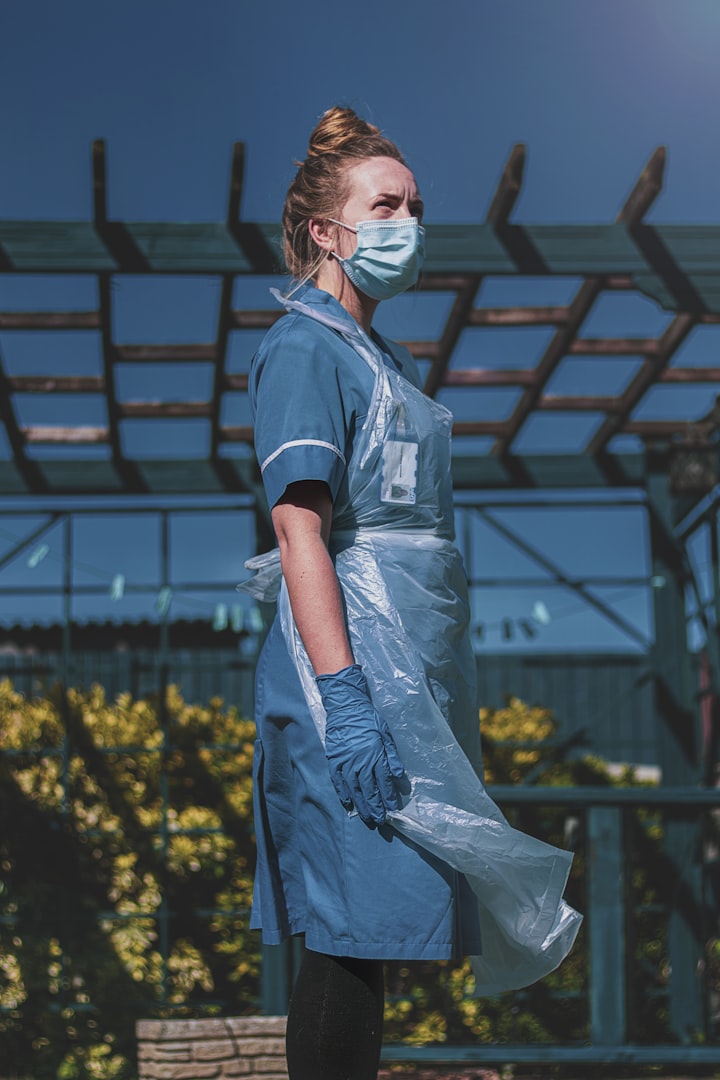
Death.
We all get there. We all see that magical “door” eventually. Everyone crosses that glorious bridge one day, looking back at their lives, maybe having regrets, secrets or feeling nothing at all. Maybe just being happy that it is finally over or not wanting to leave yet.
Death is a mystery to many of us and I don’t say I am an expert. I am far from that. I neither have been there myself nor gotten even close to a near-death-experience. So, no, I can’t really tell what it feels like.
But I have seen some things. I have seen people dying I have cared for. I have seen some people in the dying process for years and some for only a few hours.
Just to clarify at this point; I do NOT work in a hospice. I work in a care home as a healthcare assistant. I look after people with disabilities, terminal illnesses such as Parkinson’s, cancer, motor neurone disease, people who might just suffer from simple old age and/or people with mild to severe dementia.
Believe me, I could write about this all night. Every single one of the above terms deserves their own story… silent tales still to be told.
But I won’t go too much into detail. Today I will focus on the truth behind “end of life care”. I will show you what it is like to work in such a heavy-hearted environment, I will show you scenarios I have witnessed and tips and tricks on how to survive compassion fatigue (the professional term for healthcare burnout).
Me and EOL
The hardest thing to comprehend, when I first started this job, keeping in mind I was carrying my innocent pure heart on my sleeve, was to accept what end of life care really means.
In the process of becoming a paramedic, I stormed the care home with the determination of saving everyone’s life. What a silly thought that was! I clearly made a fool out of myself.
When people were sick and in the middle of the dying process, I would be going home that night looking up all the symptoms I have observed, and I would be hitting the books until past midnight. The next day I would run to the nurse, hysterically showing her that paragraph which would explain the condition the patient is in and how to heal it.
The truth is…they are not here to be saved. The nurse simply would have said “Jess, we know what the issue is. But he/she is end of life so all we do now is manage the pain and keep them comfortable”
My thoughts were racing. Why the heck would we not do something against it? Was it really that hopeless? My job was to guide and comfort them through their remaining life, that is all.
Rather sooner than later I concluded that some people actually WANT to die…and that I want them to die. Some illnesses are so horrible and carry so much suffering, mentally and physically that death is simply the best option.
Pain and a blank slate
This brings me to the next aspect of the dying process. Pain, signs and symptoms, family.
Sometimes the pain a patient is feeling can last very long and can be very intense, despite morphine intake. Some pain might be even only psychological and as a carer you are the one carrying it too. You take on the burden more times than you can count. As a carer you walk into that dying persons room to provide personal care (washing, brushing teeth, changing incontinence products etc etc) and you leave your problems and your personal stuff outside. You are a blank slate. When you finish you leave the room, and your slate is now black, full of scribbling. You just took a load off the patient because that person is either complaining of pain, or might not even be aware of crying in agony, hanging on to dear life, ready to go, or simply the family members are in severe distress, and you were there holding their hands and listening to their overwhelming life story.
Signs and symptoms
You have been trained and briefed on the symptoms of dying which include declining food and fluids, less urinating, unable to swallow, eyes becoming sort of glazed, skin turning from grey to yellow, hallucinating, rattling chest sounds, breathing starts to become shallow and rapid and towards the end there are only a few deep breaths followed by a long pause until exhaling until the next breath. It is scary as hell, I can tell you that much.
In the scenario of the resident just having passed, be prepared you are the first person of contact to his/her family, and you might not leave until they are okay. In a sense, you also care for the family. You provide them food, shelter, comfort until their dearest last breath. Very much indeed, you will be there for them as the second most important individual in their lives until the dying part is over. And yes, it is hard. It is uncomfortable. When are YOU going to sort out YOUR feelings? The answer is, never... in your free time maybe. If you really cared for that person, you might have to swallow some of your own tears. Geez how many times have I gone to the bathroom… cried a little…went back to the family, and carried on being strong for them. That’s just how it works.
Observing death
Now when you actually observe a death, be ready for some adrenaline. It is a sad but also fascinating process to watch, and your true character will reveal itself.
I once sat next to a lady who was about to die. She had not had many belongings since she stayed with us only for a few days. The room was sort of empty, but her heart was whole and pure. It was perfect. We took turns to be by her bedside and it was my turn while we waited for the family to arrive. She was my first witnessed death. I held her hand and I kept talking to her. I expected a last breath, a deep inhale, ANYTHING!
When her heart stopped, life seemed somewhat stop too. It was so quiet. I heard my own blood rushing through my veins. Suddenly time was just not important anymore. I felt as if I was the only one in that room. It was as if that human being just stopped working, like a shell with a battery that died, a clock that stopped or a switch that turned.
I shook her gently and called out her name. It was the most peculiar feeling I ever felt in my life so far. My hands started to shake, and I kept on stroking her hair. I cried. I only knew this person for a few days, but I cried.
The adrenaline must have gotten into my hands and head only. My colleague and best friend walked in and said, “Jess you are shaking, are you okay?”. The nurse came to verify the death and I finally stood up and went outside… still shaking and walking on jelly legs, with my face being blood red, my alertness level higher than ever!
All of it lasted up to 10 minutes and the crash after this high of adrenaline was sudden and unexpected. Man was I hungry….and tired. I must have burnt a few hundred calories just by being there while someone left this earth. How bizarre our bodies are, are they?
I had the best professional end of life / palliative care training, but nothing could have prepared me for this storm of emotions!
I have been attending many more deaths since then and I must admit I still feel uneasy sometimes, but with time my sorrow got less and less.
Nope. Not a 9 -5
The first time I actually realised, that the job we do as carers is not a regular job was, when providing the last offices, the last care, the final wash…. call it what you want. Basically, it means washing a dead body. I am sure not many are capable of doing that. I have done many and I don’t mind it, however some things still shock me right there and then.
You see, some people when they die, they vomit a substance looking like coffee grounds. This is due to the presence of coagulated blood in the vomit. It is almost black and smells metallic. Once I had been washing a person’s body with another colleague, I could nearly taste it in the air, the smell was that intense. I was not prepared for it to be still leaking out of the oral and nostril openings, when being dead already. We struggled to keep the white sheets white.
Trauma, mental toughness and letting go
As healthcare professionals we experience trauma every day. We get affected when people we liked leave and we feel sad and pity for ourselves and get upset. It is hard to let go and hard to remain in a stable state constantly while on the job. We carry the patient’s mental weight on our ever so naïve minds, we take their anxiety and worries and make it our own. Sometimes our hearts become very frail and transparent, and we start to feel tense in our personal lives.
I can’t stress enough how much; balance, composure and stability are key in this kind of job. I understand, many might not able to cope and leave the job after some time, never thought of it being so stressful and mentally challenging, let alone the 12 hours shifts – 4 to 5 days a week, understaffed and underpaid, constantly being on the feet, wearing surgical masks all day long; let alone wiping other people’s butts, dealing with physical and emotional confrontation and then go home and manage household, children, dog, partner, husband, studying, time out, exercise… so basically; everything else called LIFE. On top of that we must accomplish all the above with a smile, in efficient manner and timely, carry out these tasks with focus and energy and still be able to “relax” and be happy and live a love life and most importantly don’t complain about the job, best…. leave work behind and switch off, just like that.
Yeah… a nine to five job makes total sense now.
But I won’t go back to it, for sure.
I have learnt how to deal with work pressure by simply making sure I sometimes prioritize myself.
How to cope
Everyone is different but I truly believe exercise (and nutrition) or any kind of craft gives you the balance and time-out you need. As a passionate runner, boxer, reader and also writer, I make sure I set time aside for what makes me happy. Yes, there are days where I would rather stay in bed, close ears and eyes, but I know what is good for me and still push myself to pursue my passion, even if that means getting up at 5.30am for training or get to train for a race after a 12 hour shift.
If you find your thing, your hobby, your passion outside work…that is what works best for you and you enjoy your job even more.
I love my job and the path I chose because it has opened my eyes, expanded my horizon and in some ways made me a better person and I got to appreciate life even more. Let’s be honest here, I help others on a daily basis with just simply satisfying basic needs and day by day I get closer to my goals by just doing this job and letting go from time to time.

About the Creator
Jess S
One day I will be myself again,
and this darkness might come to an end,
and all doubt will cease,
and all strength will rise.
One day my tinted memories will be left behind,
and I will be able to see the world through a clear lens.






Comments
There are no comments for this story
Be the first to respond and start the conversation.